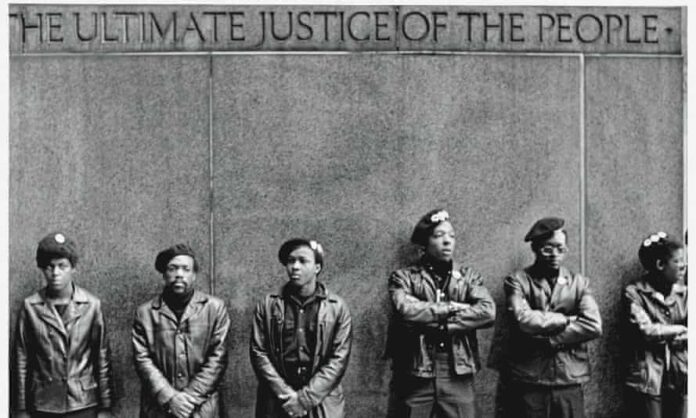
A coalition of current and retired Black police officers is calling for the release on parole of Sundiata Acoli, a former Black Panther member who has been incarcerated for 48 years for the 1973 murder of a New Jersey state trooper.
Four Black law enforcement groups have joined forces to press the case for Acoli’s parole almost half a century after he was arrested. In an amicus brief filed with the New Jersey supreme court, they call his continued imprisonment “an affront to racial justice” and accuse the parole board of violating the law by repeatedly refusing to set the prisoner free.
“Mr Acoli has spent more than half of his life in prison cells the size of a parking space, including nearly 20 years as a senior citizen … He should be granted parole,” the groups write.
Acoli is one of at least 11 former members of the Black Panther Party and its armed wing, the Black Liberation Army, who are still in prison for acts of violence committed largely in the late 1960s and 1970s. Many of the prisoners are approaching their half-century behind bars.
At 84, Acoli is the oldest of the former Black radicals still languishing in prison. He contracted Covid-19 last year from his cell in FCI Cumberland in Maryland, and is suffering from physical and mental impairments including gradual deterioration of his memory.
In a written communication with the Guardian, Acoli said that he was struggling with chronic degeneration of his hearing, eyesight, and mental and muscular capacity yet was receiving “little or no medical treatment” in prison.
“I am an 84-year-old man who’s been imprisoned since age 36 for almost 50 years, who now poses a threat not even to a flea, let alone public safety,” he said.
Acoli added: “My sentence is obviously too long. I am rapidly disintegrating before my family and friends’ eyes.”
When asked about the amicus brief, Acoli said: “The Black associations are simply expressing their opinion on what everyone already knows: that it’s time, actually past time, that I should be released.”
The intervention of the Black groups underscores a rift within police officer organizations. Powerful white-dominated law enforcement associations have been at the forefront of the battle to keep former Black Panthers incarcerated for decades.
In Acoli’s case, the New Jersey State Troopers Fraternal Association has called for him to remain “locked up and away from civil society for the rest of his life”.
Acoli, who was born Clark Edward Squire, was given a life sentence in 1974 for the murder of New Jersey state trooper Werner Foerster the previous year. Acoli had been driving along the New Jersey Turnpike together with two other members of the Black Liberation Army, Assata Shakur (born JoAnne Chesimard) and Zayd Malik Shakur (James Costan) when they were stopped by a state trooper, James Harper, over a defective taillight.
In the ensuing melee, shots were fired. Foerster was struck with four bullets and died, and Zayd Malik Shakur was also killed. Harper was wounded, and both Acoli and Assata Shakur were arrested after a police chase.
Shakur escaped and fled to Cuba, where she was granted asylum by the Cuban government. In 2013 she became the first woman to be put on the FBI’s “most wanted terrorists” list, and at age 74 she faces a $2m reward for information leading to her capture.
In the amicus brief, the four Black police officer groups make powerful arguments against Acoli’s continuing imprisonment. They point out that New Jersey has the greatest disparity in the nation between the incarceration rate of Black and white people – a gap of 12 to 1, according to the state’s Criminal Sentencing and Disposition Commission.
Almost two thirds of New Jersey prisoners serving life sentences are Black.
They also point out that prisoners on life sentences, like Acoli, tend to have the lowest recidivism rate of all classes of prisoner – and the rate falls further with age. Yet over the past 40 years the rate of prisoners granted release by the New Jersey parole board has plummeted – from 42% in the 1980s to just 7% between 2012 and 2019.
The Black groups accuse the parole board of obsessively focusing on whether Acoli has changed his radical political views rather than concentrating on the only issue they are required to consider – whether he poses a threat to the public should he be freed. The amicus brief says the board’s approach amounts to “extralegal punishment”.
Acoli first came up for parole in 1993, and on that occasion was not only denied but told he would have to wait another 20 years before he could reapply to the board. In 2014 he came close to walking free when a three-judge panel of the state appeals court ordered his release on grounds he posed no threat at all – only to have that ruling overturned by the state supreme court.
After a further round of parole board and court hearings, he is now appealing again to the New Jersey supreme court, which is expected to consider the case later this year or early next.
The four groups that have jointly written the amicus brief are: the National Association of Blacks in Criminal Justice, Blacks in Law Enforcement of America, the Black Police Experience and the Grand Council of Guardians.
Ronald Hampton, who served for 24 years as a police officer in Washington DC and who is now with Blacks in Law Enforcement of America, said that prolonged prison terms for the former Black Panthers highlighted racial distortions in the criminal justice system. “These long sentences are absurd. The system is meant to rehabilitate – prisoners who complete their sentences should be sent home, but that hasn’t worked for Black folks.”


















